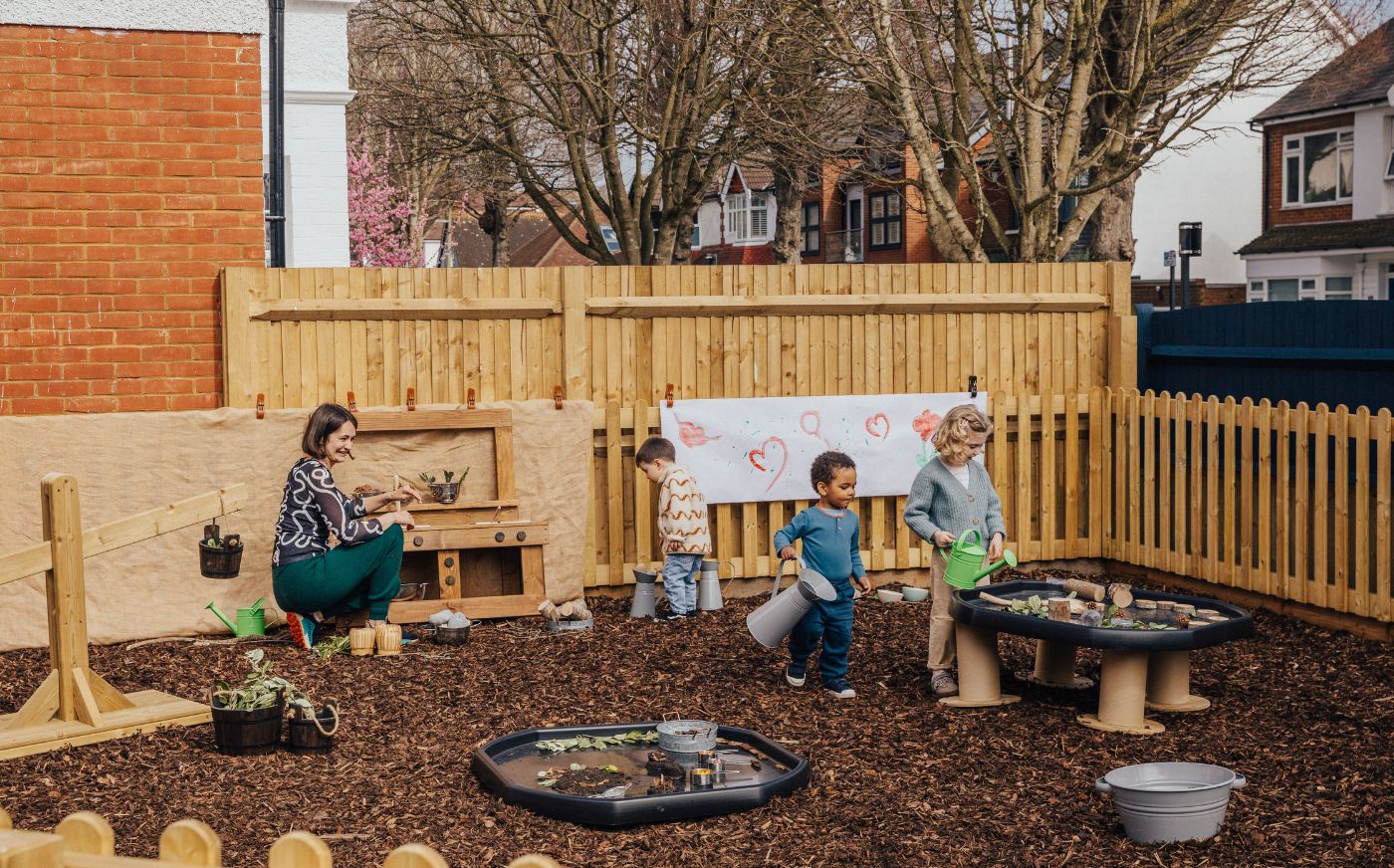Starting nursery after a break: Make a smooth transition
Returning to a nursery after a holiday can feel like starting all over again. Not […]
Read more

With screens and digital tools being an inescapable part of everyday life for children, spending time outdoors has never been more important. When you want to give your child a welcome break from technology, consider outdoor play learning. It offers them a vital opportunity to move, explore, and connect with the world around them. Outdoor time isn’t just about getting fresh air; it’s a key part of healthy development.
At N, we believe that outdoor learning should be woven into the daily life of every child at a UK nursery. From messy mud kitchens to nature trails and obstacle courses, we encourage children to explore freely, take age-appropriate risks, and grow in confidence.
Outdoor play-based learning is simply learning that happens outside through exploration, movement, and play. It can be structured, like a nature walk led by an educator, or unstructured, like building a den or playing in the mud kitchen. What matters most is that children are learning through experience and curiosity, instead of simply following instructions.
Outdoor environments offer hands-on, real-world learning that supports every area of the Early Years Foundation Stage (EYFS). From communication and language to personal, social and emotional development, the time in nature provides unique opportunities to deepen understanding. Children can count leaves, compare textures, or role-play with friends using sticks and stones.
Outdoor learning brings the EYFS to life in ways that are joyful and memorable. It also encourages self-regulation, teamwork, and physical confidence, all essential for future learning.
Time spent outdoors plays a crucial role in a child’s emotional and physical well-being. Green spaces help children feel calm and centred, especially in a world that can sometimes feel overwhelming. A growing body of research shows that being outdoors reduces stress, improves focus, and supports better behaviour and sleep in young children.
Outdoor play also allows space for children to take manageable risks, build resilience, and stretch their imagination. Climbing a log, jumping puddles, or leading a group game all help children test their boundaries and learn what they’re capable of.
At N, we believe in nurturing confidence, curiosity, and a lifelong connection with the natural world. That’s why we prioritise outdoor learning across our nurseries every single day.
Running, climbing, balancing and digging all help to strengthen growing bodies. Outdoor play supports gross and fine motor skills, coordination, and spatial awareness. It encourages movement in ways that indoor play often cannot.
Children who spend time outside become naturally curious about seasons, weather, and wildlife. They notice changes in their surroundings and begin to develop a sense of environmental responsibility.
Outdoor play learning helps children feel connected to the world beyond their nursery walls. Exploring parks, gardens, or simply watching the local postie go by fosters a sense of place and awareness of others.
With loose parts like sticks, leaves, crates, and water, children can build castles, invent new games, and create their own rules. Outdoor play promotes storytelling, roleplay, and experimentation in a way screens never can.
Outdoor spaces give children freedom to make choices and solve problems independently. Whether it’s finding their own way across stepping stones or choosing what to play next, they develop resilience and self-belief.
Daily time in nature builds a relationship with the environment. Children learn about life cycles, weather, and biodiversity through experience, laying the groundwork for sustainability and care for the planet.
At N, outdoor play learning is part of everyday life, come rain or shine. Our nursery gardens and outdoor spaces are designed to encourage exploration, independence and active play. From bug hunts and nature walks to obstacle courses and mud kitchens, our spaces are rich in opportunities for discovery.
These experiences are supported by our skilled team, who create a safe, stimulating environment for children to grow in confidence. Every outdoor experience is thoughtfully designed, and so is our approach to our nursery food: fresh, balanced meals that help children stay fuelled, focused, and ready to play.
The N curriculum also includes learning about the environment through our Global Responsibility pillar. Forest School-inspired learning experiences help children build problem-solving skills, respect for nature, and care for the wider world, all while having fun.
Outdoor play should feel exciting and safe at the same time. Here are a few ways parents and carers can help:
Encourage children to play with natural materials like stones, sticks, leaves, and mud. Let them repeat favourite games, make up new ones, and enjoy open-ended exploration.
For more ideas, download our N Guide to Outdoor Play and Learning.
Here are some simple, screen-free ideas you can try together — most require little or no kit:
You don’t need a big garden. Regular walks, bug hunts, puddle-jumping or simply playing with natural materials like stones or leaves all count. Try to let your child lead the way.
Layers are best. Choose clothes you don’t mind getting messy, waterproofs in wet weather, sun hats in summer, and comfy shoes like wellies or trainers.
Yes, with the right clothing and supervision, outdoor play is safe and beneficial year-round. N Family nurseries embrace all-weather play to build resilience.
It promotes the building of a variety of skills: social confidence, spatial awareness, problem-solving, self-regulation, and physical readiness. They are all key to transitioning into school environments.
Outdoor play learning isn’t negotiable. It’s essential to early years development. It supports physical health, sparks imagination, strengthens emotional well-being, and fosters a deep love of learning.
Outdoor play is a core part of nursery life at N. We believe that children thrive when they have the space and time to explore the world around them, with support from trusted adults.
If you’re looking for a UK nursery where outdoor play is woven into daily learning and development, explore your nearest N Family Club to see how we bring it to life.